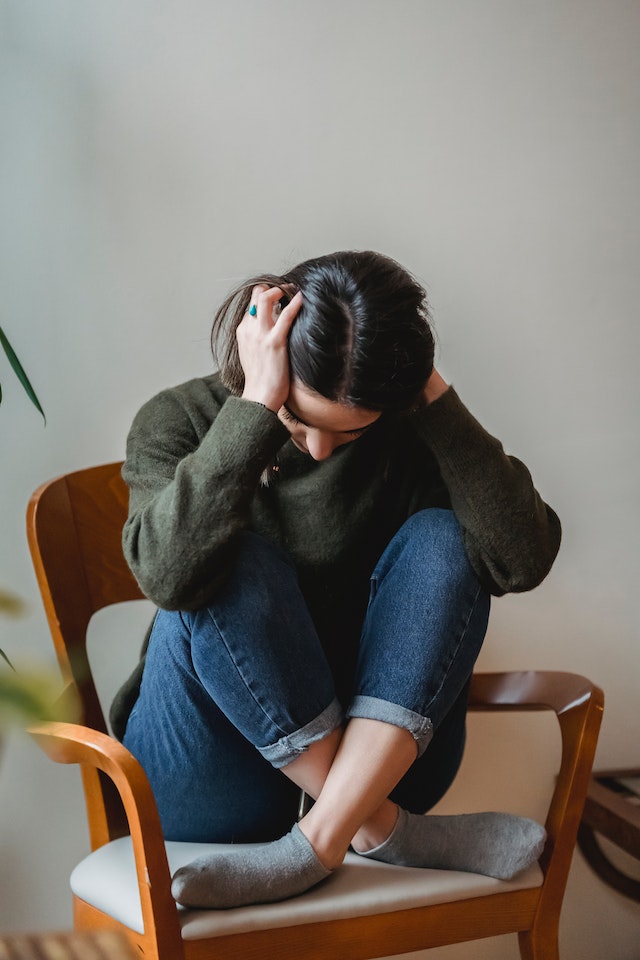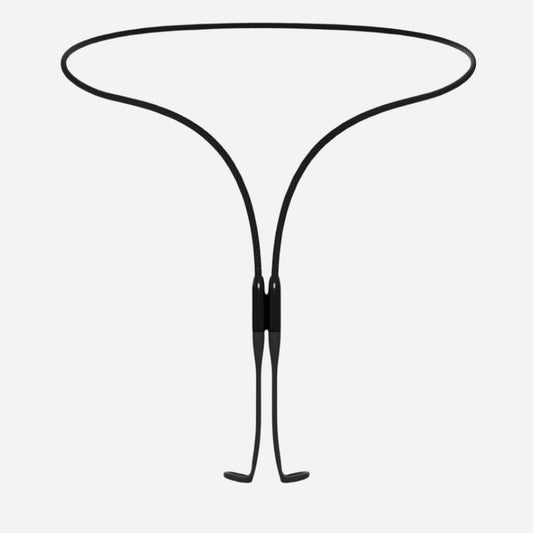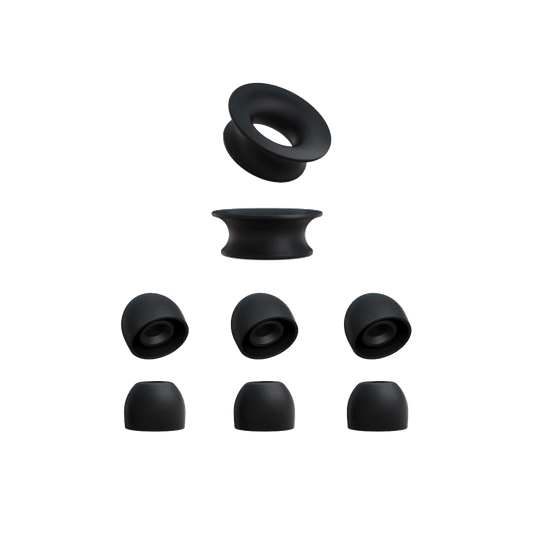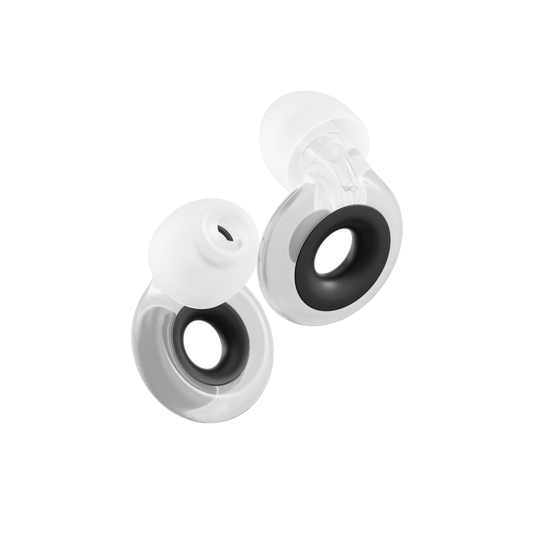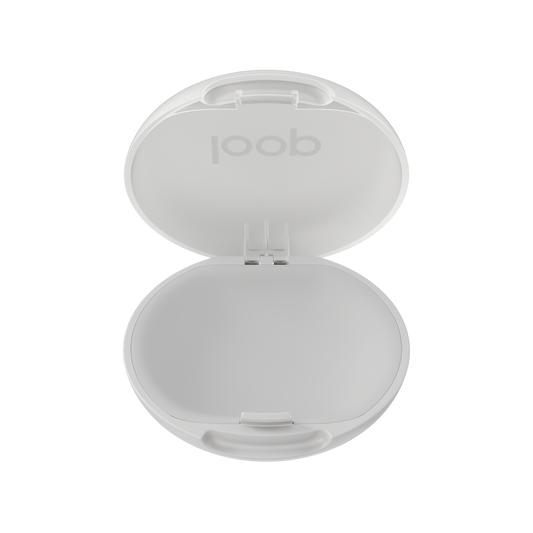Die wichtigsten Highlights:
- Übermäßiger Lärm, ob zu Hause oder am Arbeitsplatz, kann stressig sein. Er kann sich auf deine Konzentration und deinen Fokus auswirken, deinen Schlaf beeinträchtigen und dich ängstlich machen - und er kann auch dein Gehör beeinträchtigen.
- Es gibt verschiedene Möglichkeiten, gegen Lärmbelästigung vorzugehen, aber der erste Schritt sollte in der Regel sein, mit den Verursachern des Lärms zu sprechen.
- Da sich Lärmbelästigungen nicht immer schnell beheben lassen, kannst du auch andere Maßnahmen ergreifen, wie z. B. das Tragen von Ohrstöpseln, um den Schallpegel zu senken, oder die Schalldämmung deiner Wohnung.
Lärmbelästigungen am Tag oder in der Nacht können dein tägliches Leben stören - egal ob sie von deinen Nachbarn oder von Baustellen kommen. Was solltest du also tun, wenn deine Ruhe gestört wird?
Lies weiter, wir erklären dir alles, was du über Lärmbelästigung wissen musst, und geben dir Tipps, was du tun kannst.
Tipps zum Umgang mit Lärmbelästigung
Beim Thema Lärmbelästigung gibt es zwei Dinge zu beachten: wie du sicherstellst, dass du nicht die Quelle der Lärmbelästigung bist, und was du dagegen tun kannst, wenn du durch Lärm gestört wirst.
Wie man Lärmbelästigung reduziert
Wenn du zu Hause von Lärmbelästigung betroffen bist, möchtest du vielleicht etwas Zeit und Mühe investieren, um den Lärm, der in dein Haus dringt, zu reduzieren. Du kannst den Lärm deiner Nachbarn auf verschiedene Weise abblocken, z.B. durch:
- Schalldichte Vorhänge anbringen: Schwere Vorhänge können helfen, den Lärm von draußen zu absorbieren - besonders nützlich, wenn du Fenster hast, die auf eine belebte Straße blicken.
- Dichte Fenster und Türen ab: Achte darauf, dass deine Fenster und Türen gut abgedichtet sind, damit kein Lärm durch Ritzen und Spalten dringen kann.
- Investiere in einen Teppich: Ein Teppich (oder ein Teppichboden anstelle eines Holz- oder Vinylbodens) kann helfen, Schallschwingungen zu absorbieren.
- Schalldichte Wände: Erwäge, deine Wände zu isolieren oder schalldicht zu machen, um zu verhindern, dass der Lärm aus anderen Räumen in deinem Haus oder aus angrenzenden Wohnungen nach innen dringt.
- Strategisch platzierte Möbel: Das Aufstellen von Bücherregalen, Wandbehängen und dekorativen Gegenständen wie Vorhängen kann helfen, den Lärm zu dämpfen.
- Statikrauschen: Die Maskierung von Lärm mit Statikrauschen kann helfen, eine ruhigere, friedlichere Umgebung zu schaffen.
- Geräuschreduzierende Ohrstöpsel: Die Verwendung von lärmreduzierenden Ohrstöpseln kann dazu beitragen, den Lärm, der deine Ohren erreicht, auf ein sichereres Niveau zu senken und Stress und Angst, die durch Lärmstörungen verursacht werden, zu reduzieren.
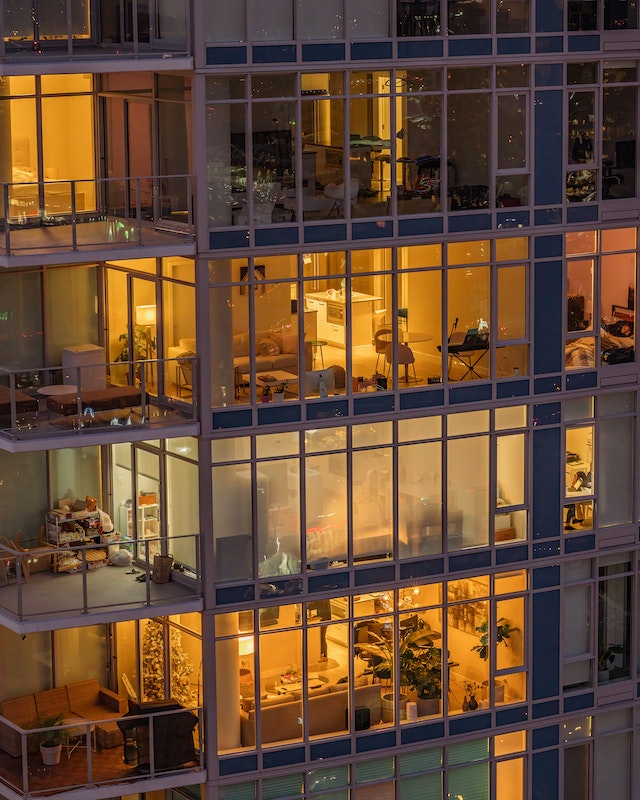

Wie man Lärmbelästigung meldet
Anhaltende Lärmbelästigung kann sich negativ auf deinen geistigen und körperlichen Zustand auswirken. Vor allem, wenn der laute Lärm dich nachts wach hält, was zu Schlafentzug und Unruhe führen kann.
Wenn du unter einer Lärmbelästigung leidest, ist es nur fair, dass du etwas unternehmen willst. Schauen wir uns also an, was du tun kannst, um Lärm in der Gemeinde und in der Öffentlichkeit entgegenzuwirken.
Gemeinschaft
In den meisten städtischen Gebieten und Gemeinden gibt es Verordnungen, die übermäßigen und unangemessenen Lärm verbieten. Wenn jemand ständig gegen diese Verordnungen verstößt, ist es gut möglich, dass du etwas dagegen unternehmen willst. Aber wenn dein Nachbar der Schuldige ist, ist es vielleicht nicht die beste Idee, gleich zur Klage zu greifen.
Hier sind einige Schritte, die du unternehmen kannst, um die Situation in den Griff zu bekommen:
- Sprecht mit ihnen
Manchmal ist die beste Option die einfachste Option. Anstatt direkt aggressiv zu werden, solltest du versuchen, ruhig auf deinen Nachbarn zuzugehen und ihn über das Problem zu informieren. Es besteht die Chance, dass sie sich des Problems nicht bewusst sind und die Situation schnell beheben können.
- Sende eine Verwarnung
Wenn das Gespräch mit dem Schuldigen nichts gebracht hat, kannst du eine schriftliche Verwarnung schicken. Diese sollte die Lärmschutzgesetze und eine Absichtserklärung darüber enthalten, wie du die Situation angehen willst, wenn der Lärm nicht aufhört.
- Schalte die Polizei ein
Wenn bis zu diesem Punkt alles nichts geholfen hat, kannst du die Polizei anrufen und eine Beschwerde einreichen. Du kannst der Polizei mitteilen, dass du Schritte unternommen hast, um die Situation zu lösen, aber keinen Erfolg hattest. Sie kann dann nachforschen und Maßnahmen ergreifen, wenn sie es für richtig hält.
- Klage einreichen
Wenn die Polizei nichts erreicht, wäre der letzte Schritt, eine Klage bei einem Gericht für geringfügige Forderungen einzureichen. Du musst Beweise für den Lärm, die von dir unternommenen Schritte und eine Zeugenaussage vorlegen. Wenn du erfolgreich bist, wird ein Gerichtsbeschluss gegen deine Nachbarn erlassen, der sie zwingt, den übermäßigen Lärm abzustellen.
Öffentlicher Lärm
Wenn die Lärmbelästigung von öffentlichen Quellen ausgeht, z. B. von lauten Bauarbeiten, ist es am besten, eine Beschwerde bei deiner Gemeindeverwaltung oder der Polizei einzureichen.
Die Polizei wird den Schuldigen höchstwahrscheinlich eine mündliche Verwarnung erteilen. Wenn der Lärm weitergeht, kannst du eine zweite Beschwerde einreichen, und es können weitere Maßnahmen ergriffen werden.
Wenn du dir Sorgen über mögliche Konsequenzen machst, wenn du eine Störung meldest, kannst du deine Beschwerde anonym einreichen. Die Polizei verlangt von dir keine persönlichen Angaben, so dass du Maßnahmen ergreifen kannst, ohne deinen Namen zu nennen.
Gesetze und Vorschriften zum Lärmschutz
Übermäßiger Lärm in öffentlichen Räumen kann störend und beunruhigend sein. Wenn du dich durch Lärm gestört fühlst, kann das zu Stress, schlechtem Schlaf, Konzentrationsschwierigkeiten und sogar zu Gehörverlust oder -schäden führen. Lärmschutzgesetze und -verordnungen spielen daher eine wichtige Rolle beim Schutz der öffentlichen Gesundheit und bei der Sicherung der Lebensqualität der Bevölkerung.
In jeder Region gelten andere Regeln, wenn es um Lärmbelästigung geht, z. B. zulässige Lärmpegel, Zeiten der Lärmbelästigung und wie Lärmbelästigung gehandhabt wird.
Was den Wortlaut des Gesetzes angeht, wird Lärmbelästigung definiert als "jedes Geräusch, jeder Ton oder jedes Signal, das den Komfort, den Frieden oder die Ruhe einer oder mehrerer Personen unangemessen stört."
Die United States Environmental Protection Agency (EPA) hat 1972 den Noise Control Act erlassen. Dieses Gesetz besagt, dass unzureichend kontrollierter Lärm eine Gefahr für das Wohlergehen und die Gesundheit der Nation darstellt. Es befasst sich hauptsächlich mit der Lärmbelästigung der Öffentlichkeit und nennt als wichtigste Lärmquellen:
* Transportfahrzeuge und -geräte
* Maschinen
* Haushaltsgeräte
* Andere Produkte im Handel
Es gibt zwar eine allgemeingültige Definition von Lärmbelästigung, aber die Gesetze und Vorschriften der einzelnen Bundesstaaten zum Thema Lärm sind unterschiedlich. Die EPA koordiniert daher die Programme aller Bundes-, Landes- und Kommunalbehörden, die sich mit Lärmbeschwerden befassen. Aufgrund dieser Unterschiede zwischen den Bundesstaaten solltest du dich auf der Website deiner Gemeinde über die Lärmschutzbestimmungen deiner Stadt informieren.
Im Vereinigten Königreich sind die Gemeinden verpflichtet, allen Beschwerden über Lärm nachzugehen, der als "gesetzliche Belästigung" (im Sinne des Umweltschutzgesetzes von 1990) angesehen werden kann. Damit der Lärm als "statutory nuisance" (gesetzliche Belästigung) gilt, muss er einen der folgenden Punkte erfüllen:
- Er muss die Nutzung einer Wohnung oder eines anderen Grundstücks unzumutbar und erheblich beeinträchtigen
- die Gesundheit schädigen oder wahrscheinlich schädigen
In Deutschland gilt in ganz Deutschland das Konzept der "Ruhezeit". Das bedeutet, dass Lärm über 50 Dezibel werktags von 22 bis 7 Uhr und sonntags ganztägig verboten ist (es gibt allerdings einige lokale Abweichungen).
Da jedes Land bzw. jede Region andere Vorschriften zur Lärmbelästigung hat, gibt es auch unterschiedliche Regeln für die Bestrafung von Lärmverstößen.
Im Vereinigten Königreich zum Beispiel können Verstöße gegen die Vorschriften zur Lärmbelästigung ohne vernünftige Erklärung mit einem Bußgeldbescheid geahndet werden (bis zu 110 Pfund für Wohnhäuser und bis zu 500 Pfund für Schankbetriebe), und wenn das Bußgeld nicht gezahlt wird, kann es zu einer strafrechtlichen Verfolgung und einer Geldstrafe von bis zu 1000 Pfund für Wohnhäuser und einem unbegrenzten Betrag für Schankbetriebe kommen.
Wenn du in Deutschland gegen die Ruhezeit-Vorschriften verstößt, kann dir ein Bußgeld von mehreren hundert Euro drohen. Und in den USA können Verstöße gegen die Vorschriften ebenfalls mit Geldbußen von bis zu 500 Dollar geahndet werden. Es lohnt sich also immer, sich zu informieren und zu wissen, welche Regeln für Lärmbelästigung in deiner Region gelten - und welche Folgen ein Verstoß gegen diese Regeln haben kann.
Wie Loop-Ohrstöpsel Lärmbelästigungen entgegenwirken
Wenn du mit Lärmbelästigung zu kämpfen hast, sei es durch Baustellen, laute Nachbarn oder eine belebte Straße, können Ohrstöpsel eine gute Möglichkeit sein, den Lärm zu reduzieren. In manchen Fällen können Lärmbelästigungen dein Gehör schädigen - und in anderen Fällen, wenn du empfindlich auf Lärm reagierstkann Lärmbelästigung überwältigend, stressig und beunruhigend sein.
Wir haben eine Reihe von Ohrstöpseln zur Auswahl, die für ein ausgewogenes Klangerlebnis sorgen, indem sie schädlichen Lärm reduzieren und stressige Geräusche abschwächen, während wichtige Geräusche weiterhin gehört werden können:
- Loop Experience reduzieren den Lärmpegel um bis zu 17 dB (SNR) und sorgen gleichzeitig für eine hohe Klangqualität - sie sind also ideal für die Lärmminderung im Alltag, aber auch für Konzerte, Festivals und Live-Sportveranstaltungen.
- Loop Quiet sind ideal für konzentriertes und ungestörtes Arbeiten. Sie bieten eine Geräuschreduzierung von 24 dB (SNR) und helfen dir, den Lärmpegel zu reduzieren und in deine Ruhe zu kommen. Sie sind auch ideal, um den Geräuschpegel beim Einschlafen zu reduzieren, wenn draußen viel Lärm herrscht.
- Loop Engage sind ideal für den Einsatz in lauten Umgebungen, z. B. wenn du versuchst zu arbeiten, wenn es zu Hause oder draußen viel Lärm gibt. Sie dämpfen die Hintergrundgeräusche und sorgen für mehr Klarheit bei Gesprächen - eine gute Wahl, wenn du lärmempfindlich bist.
- Loop Switch 2 bietet dir den Komfort von 3 Ohrstöpseln in einem, die mit einem einzigen Schalter bedient werden. Das heißt, du kannst je nach Situation von Experience zu Quiet zu Engage und wieder zurück wechseln.
"Ausprobiert und getestet in einer sehr belebten Gegend in London kann ich mit Sicherheit sagen, dass sie erstaunlich sind. In der einen Nacht, in der ich sie nicht benutzt habe, konnte ich so viel von den belebten Straßen in der Nacht hören, dass ich einfach nicht schlafen konnte. In der folgenden Nacht habe ich sie dann benutzt, ich habe nichts gehört und geschlafen wie ein Baby, wahnsinnig gut."
Bernard H.
Loop Earplugs
Loop Switch 2
Die wichtigsten Erkenntnisse:
Übermäßiger Lärm, ob zu Hause oder am Arbeitsplatz, kann stressig sein. Er kann sich auf deine Konzentration und deinen Fokus auswirken, deinen Schlaf beeinträchtigen und dich ängstlich machen - und er kann auch dein Gehör beeinträchtigen. Wenn du also von Lärmbelästigung betroffen bist, ist es für dein allgemeines Wohlbefinden und deine Lebensqualität wichtig, etwas dagegen zu unternehmen.
Zunächst solltest du die Ursache der Lärmbelästigung ansprechen, indem du mit deinem Nachbarn, den Bauarbeitern oder dem Verursacher des Lärms sprichst. Es kann jedoch einige Zeit dauern, bis diese Probleme gelöst sind. Deshalb gibt es auch Maßnahmen, die du ergreifen kannst, um die Auswirkungen von Lärmbelästigungen zu verringern, wie z.B. die Schallisolierung deines Hauses und das Tragen von Ohrstöpseln, um den Lärm abzuschwächen und eine ruhige Umgebung zu genießen.












